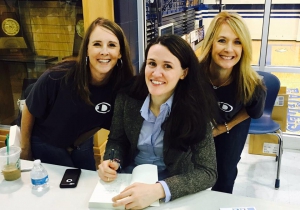From Homeless to Harvard: Transcendent Lessons from Liz Murray
 Once living on the streets and now a published author and Harvard graduate, Liz Murray captivated the audience at the 2016 Wise County convocation with her inspiring story of grit, optimism, will, and triumph amidst incredible odds.
On August 15, 2016, Liz shared with a crowd of Bridgeport ISD and Decatur ISD faculty and staff what she learned about the importance of education through her personal struggles growing up as a homeless teen and daughter to drug-addicted parents. By the age of 15, living in poverty made Liz feel “separate from society.” She admitted that while sleeping in subways at night to stay warm and chewing on ice cubes to curb hunger, she had “completely given up” on herself and any opportunity for creating a different future.
Once living on the streets and now a published author and Harvard graduate, Liz Murray captivated the audience at the 2016 Wise County convocation with her inspiring story of grit, optimism, will, and triumph amidst incredible odds.
On August 15, 2016, Liz shared with a crowd of Bridgeport ISD and Decatur ISD faculty and staff what she learned about the importance of education through her personal struggles growing up as a homeless teen and daughter to drug-addicted parents. By the age of 15, living in poverty made Liz feel “separate from society.” She admitted that while sleeping in subways at night to stay warm and chewing on ice cubes to curb hunger, she had “completely given up” on herself and any opportunity for creating a different future.
Liz dubbed her middle school self as the “worst possible” student – the one who, statistically, should not be standing on a stage as a Harvard graduate speaking to teachers about the impact of education. But, she aptly stated, “everyone knows what it feels like to check out and give up.” How she reacted to this emotion – in spite of dire situational circumstances – is what makes her a statistical (and inspirational) anomaly.
Liz began to emerge from a potentially perilous downward spiral following her mother’s death from AIDS, prompted by a stark realization that the time for her to change her life trajectory was “now, or maybe never.”
She asked the audience to imagine what was happening in their families when they were born. For her and her sister, they grew up witnessing their family living off of welfare checks – and believing that was how everyone in the world got money. She joked that her family celebrated 12 holidays per year: every 1st of the month (although she watched her parents spend most of each month’s money fueling their crippling cocaine addiction).
Liz shared that like most children, her early perceptions about the world were developed largely from the conversations she heard at home. In her case, the majority of these discussions focused on her family’s survival. She regularly heard the mantra, “things will get better one day” – without talk of any tangible plans for how to make “one day” come to fruition.
A simple truth Liz established: People cannot give what they don’t have. Her father, while unemployed and homeless, often could not give her the safety of a reliable shelter, adequate food, or clean clothes. But he could take her to the public library every Saturday. Seemingly small actions like this one – by her father and others in her community – formed a critical foundation that Liz would leverage to gain incremental success.
Other formative moments in her educational development included experiences with teachers who sought to support and motivate her. She juxtaposed two opposing, but (in her view) equally ineffective interventions during her public education:
- The “sympathetic” teacher, who told her not to worry about her schoolwork. This approach excused Liz from accountability. Without any expectations for her to uphold a standard or fulfill obligations, Liz felt something was innately wrong with her – that perhaps she couldn’t fulfill expectations, as nothing was being asked of her.
- The “tough love” teacher, who told her that regardless of her difficult situation, she alone would be held responsible for ensuring her own academic and life success. This approach made her feel ashamed. How was she to overcome these obstacles completely by herself? Didn’t everyone need and deserve some support?
Through these encounters, Liz developed her own method of motivation. Transitioning to a “what if” mindset helped reset her thinking: “What if I tried hard in school?” “What if I got straight A’s?”. She believed the difference-maker in her life was at the age of 17, when she stopped counting what she did not have, and started being thankful for what she did have.
This newfound hope and determination enabled her to build confidence, grow her skills, improve her grades, and ultimately win a scholarship to attend Humanities Preparatory Academy for high school. She graduated in two years.
During Liz’s acceptance interview for the Preparatory Academy, her interviewer looked her squarely in the eyes and said: “You have so much work to do. Are you ready to work? I need a yes or no.”
Liz’s life history was previewed in her answer to that question. Nights sleeping on park benches and subways. Mornings waking up hungry. Sideways glances from strangers. Watching her parents miss out on their dreams. Feeling “separate” from society. All of these experiences had led her to this one moment that could transform her future.
Liz’s answer to this opportunity was resounding and unequivocal.
“Yes.”
Key Takeaways
Key education insights from Liz’s speech included:
- Love students by holding them to a higher standard.
- Respect every student’s story, because every story matters.
- Inspire students to believe in themselves, dream big, and persevere.
Most of all, Liz encouraged educators to equip students with the knowledge, skills, and confidence that allows them to answer opportunity with a resounding and unequivocal, “Yes.”
